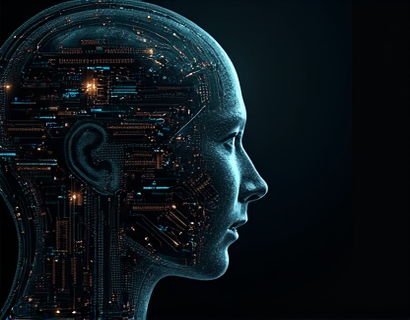Unlocking Enhanced User Engagement: AI and Crypto Strategies for Digital Transformation in the Ucosystem Marketplace
The digital landscape is rapidly evolving, driven by technological advancements that redefine how we interact with online ecosystems. At the forefront of this transformation are the converging powers of Artificial Intelligence (AI) and Cryptocurrency. These technologies, when harnessed together, offer unprecedented opportunities to enhance user engagement, streamline transactions, and create more intuitive and secure digital experiences. This article delves into the strategic insights for tech pioneers and early adopters aiming to thrive in this dynamic environment, focusing on how AI and cryptocurrency can elevate user engagement within the Ucosystem marketplace.
Understanding the Synergy Between AI and Cryptocurrency
The integration of AI and cryptocurrency is not merely a technological curiosity but a strategic necessity for modern digital platforms. AI brings intelligence, automation, and personalization to the forefront, while cryptocurrency offers a decentralized, secure, and transparent method of transaction. Together, they create a powerful synergy that can revolutionize user engagement in several ways.
Firstly, AI algorithms can analyze vast amounts of user data to predict preferences, behaviors, and needs. This predictive capability allows for highly personalized experiences, ensuring that users receive content and services tailored to their interests. In the context of cryptocurrency, this means transactions and interactions can be customized, making the digital experience more relevant and engaging.
Secondly, the transparency and security provided by blockchain technology, the backbone of cryptocurrency, enhance trust among users. When combined with AI-driven insights, this trust can be further fortified, encouraging more active participation and longer engagement times. Users are more likely to explore and interact with a platform that they perceive as secure and fair.
Enhancing User Experience Through Personalization
Personalization is a cornerstone of enhanced user engagement. AI algorithms can process user data to create detailed profiles, identifying patterns and preferences that inform content delivery and service recommendations. For instance, a digital marketplace can use AI to curate a feed of products or services that align with a user's past interactions and expressed interests.
In the Ucosystem marketplace, this personalization extends to the way users interact with apps and services. AI can optimize user interfaces, streamline navigation, and even predict the next action a user is likely to take, thereby reducing friction and increasing satisfaction. By leveraging machine learning, these systems continuously improve, adapting to user feedback and behavior over time.
Cryptocurrency adds another layer of personalization through the use of tokens and smart contracts. Tokens can be used to reward users for specific actions, such as completing a purchase, referring a friend, or engaging with content. These tokens can then be used within the ecosystem, creating a closed-loop system that incentivizes desired behaviors. Smart contracts automate these processes, ensuring that rewards are distributed fairly and transparently, further enhancing user trust and engagement.
Secure and Transparent Transactions
Security and transparency are paramount in building user trust and encouraging active engagement. Cryptocurrency, with its decentralized and immutable ledger, provides a robust framework for secure transactions. When integrated with AI, this security can be further enhanced through advanced fraud detection and prevention systems.
AI algorithms can monitor transaction patterns in real-time, identifying anomalies and potential fraudulent activities. This proactive approach not only protects users but also maintains the integrity of the platform. Users are more likely to engage with a system that they feel is safeguarding their interests.
Transparency is another key aspect. Blockchain's public ledger allows users to verify transactions and interactions, fostering a sense of trust and accountability. AI can enhance this by providing clear, user-friendly explanations of transaction histories and smart contract executions. This transparency builds confidence, encouraging users to participate more deeply in the ecosystem.
Gamification and Incentivization
Gamification, the application of game-design elements in non-game contexts, is a powerful tool for enhancing user engagement. By incorporating elements such as points, badges, and leaderboards, platforms can motivate users to engage more actively. AI can optimize gamification strategies by analyzing user behavior and preferences, tailoring rewards and challenges to maximize engagement.
Cryptocurrency plays a crucial role in this process through the use of tokens as rewards. These tokens can be earned through various activities, such as completing tasks, contributing content, or participating in community discussions. The value of these tokens can be tied to the platform's native cryptocurrency, creating a tangible incentive for users to stay engaged.
Smart contracts can automate the distribution of these rewards, ensuring that users receive their tokens promptly and without the need for intermediaries. This automation not only reduces costs but also increases the reliability and fairness of the system, further boosting user satisfaction and engagement.
Community Building and Decentralization
Decentralization, a core principle of blockchain technology, aligns well with the goals of community building and user empowerment. By removing central authorities, decentralized platforms create a more democratic and inclusive environment. AI can support this by facilitating community interactions, moderating content, and identifying key influencers within the community.
AI-driven tools can analyze community dynamics, providing insights into user interactions and sentiment. This data can be used to foster a sense of belonging and encourage user participation. For example, AI can identify and highlight valuable contributions, rewarding users for their efforts and fostering a positive, collaborative atmosphere.
Decentralization also empowers users by giving them more control over their data and interactions. Through blockchain-based identity management, users can manage their digital identities securely and privately. AI can enhance this by providing tools for users to control how their data is used and shared, further enhancing trust and engagement.
Scalability and Efficiency
As digital ecosystems grow, scalability and efficiency become critical challenges. AI can optimize various aspects of the platform, from content delivery to resource management, ensuring a smooth and seamless user experience. Machine learning algorithms can predict traffic patterns, adjust server resources dynamically, and optimize content delivery networks (CDNs) to reduce latency and improve load times.
Cryptocurrency, particularly through the use of smart contracts, can automate and streamline backend processes. For instance, smart contracts can manage payment processing, content licensing, and other transactions in real-time, reducing the need for manual intervention and minimizing errors. This automation not only improves efficiency but also reduces operational costs, allowing more resources to be allocated to enhancing user experiences.
Case Studies and Real-World Applications
Several platforms have successfully integrated AI and cryptocurrency to enhance user engagement. One notable example is a decentralized social media platform that uses AI to curate personalized feeds and rewards users with tokens for creating and sharing high-quality content. The platform's blockchain-based system ensures that content creators are fairly compensated, fostering a vibrant and active community.
Another example is a gaming ecosystem where AI-driven NFTs (non-fungible tokens) are used to create unique in-game assets. These assets can be bought, sold, and traded using the platform's native cryptocurrency, creating a robust economy within the game. AI algorithms optimize matchmaking, personalize game experiences, and even generate dynamic content, keeping players engaged for longer periods.
These case studies demonstrate the potential of AI and cryptocurrency to transform user engagement in digital ecosystems. By leveraging these technologies, platforms can create more personalized, secure, and rewarding experiences, driving growth and user satisfaction.
Challenges and Considerations
While the integration of AI and cryptocurrency offers numerous benefits, it also presents challenges that must be carefully managed. One of the primary concerns is regulatory compliance. The use of cryptocurrency is subject to varying regulations across different jurisdictions, and ensuring compliance can be complex. Platforms must stay informed about legal requirements and adapt their strategies accordingly.
Another challenge is the technical complexity of integrating these technologies. Developing robust AI systems and blockchain infrastructure requires specialized expertise and significant resources. However, the long-term benefits far outweigh the initial investment, as these technologies can drive sustainable growth and user engagement.
User education is also crucial. Many users are still unfamiliar with cryptocurrency and blockchain technology. Providing clear, accessible information and user-friendly tools can help bridge this knowledge gap, encouraging more users to adopt and engage with these technologies.
Conclusion
The convergence of AI and cryptocurrency represents a transformative opportunity for digital ecosystems to enhance user engagement, security, and personalization. By leveraging these technologies, tech pioneers and early adopters can create more intuitive, rewarding, and trustworthy platforms. As the digital landscape continues to evolve, those who embrace this synergy will be well-positioned to thrive and lead the way in the next phase of digital transformation.










































